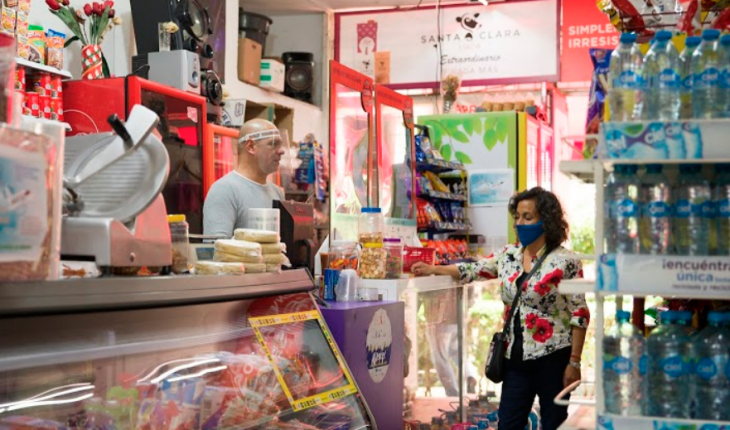The announcement to enter the grocery store of Don Blas, in the San Rafael colony of Mexico City, makes clear his concern for the health of him and his clients: to enter the cover is mandatory and only one person can enter, the other buyers must wait outside and line up.
Although it never closed because of the COVID-19 pandemic, it does recognize that sales have dropped since the confinement began, now with the so-called new normal, it peaks, but the situation that lived only in February this year is still far away.
Although the retail sector of groceries and food entered the category of essential activity during the so-called National Day of Healthy Distance, it proved to be one of the most affected during quarantine.
The National Institute of Statistics and Geography (INEGI) reports that retail revenue (including grocery stores) fell 23.7% in April, 23.3% in May and 17.2% in June compared to the same month last year.
Meanwhile, staff occupied by this sector fell 9.1% in April, 8.4% in May and 8.3% in June when comparing what was recorded in 2020 and 2019 in the MONTHLY Business Survey of INEGI; that is, the retail sector employed fewer people and reduced their income in the first three months of the pandemic, although an uptick is already beginning to be noticed.
It is estimated that there are about 1.2 million grocery stores in Mexico, on which up to 3 million people depend – whether as owners, employees or family members helping to serve trade – on which the average annual income of workers is 56,515 pesos, as estimated in the 2019 INEGI Trade Census.
Don Blas is part of this sector and recognizes that he has struggled these days to keep the ship afloat, but he hopes that the situation will gradually improve.
The merchant’s appreciation is echoed in the survey “COVID-19 Impact on Small Trade” prepared by the National Alliance of Small Traders and which was released on July 28 of this year in which it is estimated that some 150,000 small shops are bankrupt because of the economic effects of the pandemic.
This study indicates that 9 out of 10 traders interviewed point out that one of the main challenges in the so-called new normal is to generate a quality assortment at competitive prices in their stores, in addition to implementing preventive protocols (covers mouths, antibacterial gel, sanitization and attention one by one) and promoting home service as necessary measures to maintain their income.
In addition, a number of encouraging data are apparent from the survey: 99% of traders apply at least one preventive measure to prevent contagion; 80% recognize preventive hygiene measures and 75% introduced some coVID-19 product into their trade.
RENEW OR DIE
With the call to stay home and leave as little as possible, many consumers decided to make much of their purchases through digital platforms, which meant an additional problem for the owners of the tienditas.
Gabriel Richaud, CEO of IAB Mexico – Civil Association that brings together Mexico’s leading interactive marketing companies – considered that before the pandemic small shops did not have the tools and skills to respond to the needs generated by this new normal, so they were forced to adapt to this situation in order to compete with the variety of applications that allow purchases to be made in supermarkets.
Whether developing their own platforms, or joining digital instant messaging applications, small retailers had to “technology” in no time.
In many cases they had support, for example, Wabi, a startup designed to boost local commerce, which was recently allied with the Mexican Coca-Cola Industry (IMCC) and other companies, so that small shopkeepers can strengthen their services, train and serve their potential customers in the digital channel.
“It is important to bring small businesses closer to the use of technology, this will make it easier for them to understand the needs of their potential customers and transform; the new normal could represent not only the transition to digitization, but a sum of value for the entire ecosystem,” IMCC reported.
A GIANT EFFORT
Walking through any country city serves to see how small traders have adapted to the new normal. Don Blas, for example, every dayga equipped to your store with bucket covers and mask; he also took steps to keep his clients healthy and protect themselves from eventual contagion with new tools like a plastic at his counter.
In addition, the cleaning and sanitization of whether store is done daily and thoroughly to make your customers feel safer when entering.
But this is not an isolated or one-off effort. For the new normal, small businesses demonstrated their resilience, but many initiatives also emerged to support them.
One of them was #MiTiendaSegura which began with a call from companies such as IMCC, Kellogg, Mars, Mondeléz Mexico and PepsiCo, in addition to the Concanaco and Coparmex to support small shops, but also to share them sharing basic safety and hygiene actions.
In the midst of this effort, IMCC delivered 50,000 protective bulkheads (transparent acrylic) to shopkeepers to drive healthy distance and protect local owners, their families and customers.
The owners and operators of the tienditas were also advised to change the distribution of their premises and establish cleaning and hygiene protocols to preserve safe spaces and sales for all.
IMCC also distributed more than 212,000 masks – made from one million bottles of recycled PET at the PetStar plant – to the country’s sales force and shopkeepers for protection, as well as responding to the concerns of buyers and traders in the time of the epidemic.
Finally, in more than 25,000 tienditas IMCC installed what is known as a new attention “window”, which simulates a bank window with a small space at the bottom to make the transaction of money in the tienditas.
“Separated we are small, but together we are giants, it is the essence of this tribute that, through materials installed in the same businesses and on social networks, as well as in advertisements on radio, television and on the streets, sought to touch the hearts of Mexicans and invite them to be as big as our shopkeepers and support them by shopping in their premises as if they were an extension of our own homes,” he said on the imCC theme.
Currently the IMCC serves more than 1.2 million customers of which 885 thousand are corner tienditas; 85% of small and medium-sized shops are highly susceptible to contingency. In this sense, it continues to create alliances and networks within private and public industry, because together we are stronger.





